Publications
-
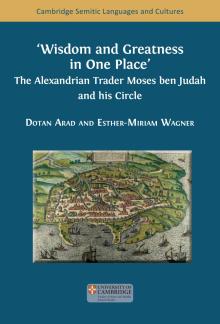
'Wisdom and Greatness in one Place' The Alexandrian Trader Moses ben Judah and his Circle
SummaryThe manuscript collections of the Bodleian Library contain a corpus of dozens of documents from the archive of Moses ben Judah. A leader of the Jewish community in Alexandria, he was also a prominent businessman and in contact with individuals from Cairo to Sicily. This collection of documents at the Bodleian likely did not emerge from the Cairo Genizah, but from another depository, and appears to have been buried at some point.
The documents, which include letters and deeds, shed light on the world of the Jewish elite of a Mediterranean city at the end of the Middle Ages, their communal and business life, connections between Jewish communities, and intellectual trends and tastes among educated Jews. They improve our understanding of the lives of Alexandrian Jews in the late Middle Ages and provide new data about the local leadership and its relations with the Nagidate (the central Jewish leadership) in Cairo, the cantors, the poll tax and its effects, and more.
We hear about tensions within this society and the growing presence of European (Italian, Greek, Iberian, and conversos) Jews within the complex social mosaic of Egyptian Jewry in the late Mamluk period. The documents inform us about Alexandria’s Jewish community and the commercial networks of the Mediterranean world, in which Jews traded alongside Christians and Muslims.
This volume makes an important contribution to the study of Judaeo-Arabic at a watershed moment. Sources from the late Mamluk period show Judaeo-Arabic at a linguistic border between Classical and Late Judaeo-Arabic. The volume will therefore further readers’ knowledge of historical linguistics of Arabic in general, and Judaeo-Arabic in particular.
The phrase ‘Wisdom and Greatness in One Place’ in the title of the book is a quotation from the Babylonian Talmud (Giṭṭin 59a), the meaning of which is that it is rare to find combined in one man political leadership and intellectual pre-eminence. -
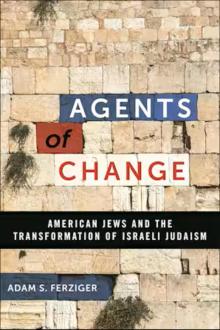
Agents of Change : American Jews and the Transformation of Israeli Judaism
SummaryAuthor
Adam S. Ferziger is Professor and holds the Rabbi S. R. Hirsch Chair in the Israel and Golda Koschitzky Department of Jewish History and Contemporary Jewry at Bar-Ilan University, Ramat-Gan, Israel, and is Co-Convener of the annual Oxford Summer Institute on Modern and Contemporary Judaism, University of Oxford, UK. He is the author of Beyond Sectarianism: The Realignment of American Orthodox Judaism, winner of a National Jewish Book Award.
Description
The rise of moderate Orthodox Judaism in Israel and the key role of Americans in its emergence
The conservative ultra-Orthodox and redemptive "Kook" camps hold sway over religious matters in Israel. Yet from the mid-1960s to the early 1980s, a small cadre of American immigrants arrived in Israel and established or led a range of educational institutions that trained thousands of advanced students and laid the ideological foundations for an Israeli moderate religious stream. In Agents of Change, Adam S. Ferziger highlights the parts played by these Americans in promoting the rise of a transnational community of moderate Jewish Orthodoxy.
Analyzing the novel outlooks that have found expression in central areas of debates, from women’s engagements in religious and public life and approaches to the gay and lesbian community to interactions with non-Orthodox denominations and attitudes toward academic Jewish studies, Ferziger illuminates both shifting religious dynamics in Israel as a result of this rise in moderate Orthodoxy, as well as the changing relationship between Israeli and American Judaisms, challenging current understandings which see the Jewish communities of the two nations as drifting apart. Though a minority in Israel, this vocal Orthodox community with a more moderate take on key issues is significant in potentially paving the way for social change. Increasingly, their influence is being felt. Shedding light on the impact of American migration in forming a burgeoning moderate religious direction in Israeli life that has challenged the hegemony of the long dominant direction within Religious Zionism, Agents of Change offers a fresh perspective on the multifaceted collaboration of ideas and practices that exists between Israel and America.Praise
An essential contribution to our understanding of the state of Judaism in the Jewish state as well as the rich spiritual interaction between American Jews and Israelis. If you are looking for an affirmation of hope in Israel's future, this book is a good place to begin. ~Yossi Klein Halevi, author of Like Dreamers: The Story of the Israeli Paratroopers Who Reunited Jerusalem and Divided a Nation
How did Orthodox Jews overcome their suspicion of Zionism as a secular movement and come to love the State of Israel? In this fascinating and highly original book, Adam Ferziger, a renowned scholar of modern Orthodoxy, describes the blossoming of a moderate Orthodoxy within Religious Zionism, a formidable political power in Israel today. ~Susannah Heschel, Dartmouth College
Amid the debate about distancing between American Jews and Israelis, Ferziger’s important book focuses on a critical counter-trend: American visionaries who have been influential in shaping Israel. With his rich, nuanced understanding of the Jewish landscape, Ferziger demonstrates that these leaders didn’t just come from America: America went through them. ~David Makovsky, The Washington Institute for Near East Policy
-
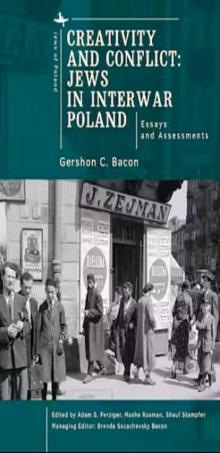
Creativity and Conflict. Jews in Interwar Poland. Essays and Assessments
SummaryDescription
Professor Gershon C. Bacon held the Marcell and Maria Roth Chair in the History and Culture of Polish Jewry at Bar-Ilan University's Israel and Golda Koschitzky Department of Jewish History and Contemporary Jewry in Ramat Gan, Israel. He has authored numerous books and articles on Polish Jewish history and currently serves as editor-in-chief of the journal Gal-Ed: On the History and Culture of Polish Jewry, while continuing his research and writing.
Contents
Preface
Acknowledgments
Notes on Commentators
Notes on Transliterations, Place-Names, and Publishers
Maps
Introduction: Interwar Polish Jewish History: A Reevaluation
Moshe Rosman
Part One
Looking Back: Society and Religion in Pre-World War I Poland
Jewish Society in the Polish Congress Kingdom, 1860-1914
Antony Polonsky comments
Prolonged Erosion, Organization, and Reinforcement: Reflections on Orthodox Jewry in Congress Poland., c. 1850 to 1914
Shaul Stampfer comments
3. Religious Coercion, Freedom of Expression, and Modern Jewish Identity in Poland:
I. L. Peretz, Sholem Asch, and the "Circumcision Scandal" in Warsaw, 1908
Adam Ferziger comments
Part Two
Society, Youth, Women, and Politics: Aspects of Jewish Life in Interwar Poland
4. Partial Success, Great Achievements: On Jewish Autonomy in Interwar Poland
Marcin Wodzinski comments
5. National Revival, Ongoing Acculturation: Jewish Education in Interwar Poland
Natalia Aleksiun comments
6. To Enlist the Enthusiasm of the Young: Orthodox Jewish Non-Political Responses to the Challenges of Interwar Poland
Uriel Gellman comments
7. The Missing 52%: The State of Research on Jewish Women in Interwar Poland and Its Implications for Holocaust Studies
Dalia Ofer comments
8. Woman? Youth? Jew?: The Search for the Identity of Jewish Young Women in Interwar Poland
Eliyana Adler comments
9. Reluctant Partners, Ideological Rivals: Reflections on the Relations between Agudath Israel and the Zionist and Religious Zionist Movements in Interwar Poland
Ada Gebel comments
Part Three
Struggles and Scandals: The Politicization of the Polish Rabbinate in Interwar Poland
10. Ideology of Agudath Israel: "Da'at Torah" and "Birthpangs of the Messiah"
Aryeh Edrei comments
11. Enduring Prestige, Eroded Authority: The Warsaw Rabbinate in the Interwar Period
Asaf Yedidya comments
12. The New Jewish Politics and the Rabbinate in Poland: New Directions in the Interwar Period
Mordecai (Motti) Zalkin comments
Part Four
Jews as Part of the Fabric of Polish Society
13. Messianists, Pragmatists, and Patriots: Orthodox Jews and the Modern Polish State
Kamil Kijek comments
14. Polish-Jewish Relations in Modern Times: The Search for a Metaphor and a Historical Framework
Yitzhak Conforti comments
Contributors
Professor Gershon C. Bacon held the Marcell and Maria Roth Chair in the History and Culture of Polish Jewry at Bar-Ilan University's Israel and Golda Koschitzky Department of Jewish History and Contemporary Jewry in Ramat Gan, Israel. He has authored numerous books and articles on Polish Jewish history and currently serves as editor-in-chief of the journal Gal-Ed: On the History and Culture of Polish Jewry, while continuing his research and writing.
-
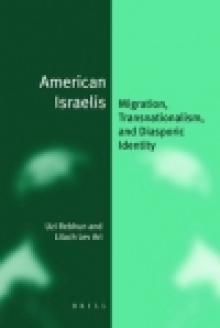
American Israelis
SummaryThis book is a scientific and comprehensive analysis of Israelis who live in the United States. Using different complementary sources of data, and through cutting-edge approaches in the social sciences, this volume examines the settlement patterns of the Israeli immigrants, their social profile, their economic achievements, their Americanization processes, as well as the nature and rhythm of their Jewish identification including changes in attachment to the homeland. The characteristics of the immigrants shed light on Israeli society. At the same time they also have important implications for the Jewish community in the host country and on Jewish continuity in America.
"...Rebhun and Lev Ari do what the title outlines. They offer nuanced and in-depth insights into transnationalism, identity and diaspora of American Jewish Israelis. Based on their theoretical and methodological expertise, the book can be recommended to scholars of these areas, regardless of its focus on Israel. For experts, American Israelis is a gem: it offers so much in terms of data and analysis that it makes for many questions, which should be addressed in further research, qualitative and quantitative alike."
Dani Kranz, Erfurt University"This book is central to Israeli Studies as it has comprehensive and current data on Israelis in America."
Yoram Bitton, Columbia University -
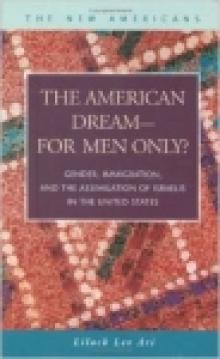
The American Dream--For Men Only?
SummaryLev Ari looks closely at three components of Israelis immigration to and assimilation in the USA: motives and the decision to emigrate; economic, social and cultural assimilation, and the respondents attitudes toward a return to Israel. The theoretical framework is anchored in new perceptions of migration research, particularly in transnationalism theory. These attempt to understand migration more deeply as a combination of socioeconomic and cultural influences. Migration to the USA increases choices for some groups of immigrants, both men and women, while among others, differences in status and in sources of power persist even after they emigrate.
-
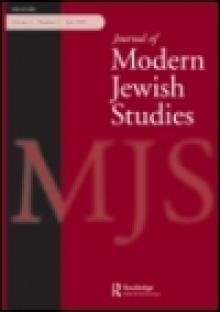
-
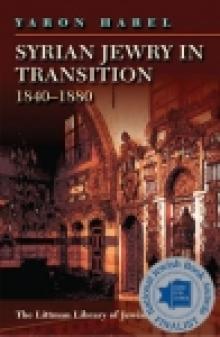
Syrian Jewry in Transition, 1840–1880
SummaryDetailed and compelling, this pioneering study of Syria's key Jewish communities at an important juncture in their history covers Jewish community life, the legal status of Jews in Syria, their relationship with their Muslim and Christian neighbours, and their links with the West. Drawing on a wide range of archival material in six languages, it brings to light an enormous amount of material and provides a broad, multifaceted perspective on Jewish life in Syria.
-
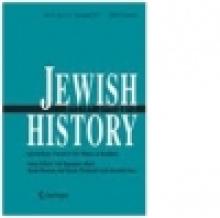
Toward a New History of Hasidism
Summary -
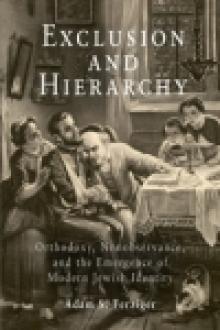
Exclusion and Hierarchy: Orthodoxy, Non-Observance and the Emergence of Modern Jewish Identity
SummaryFrom the eighteenth-century a rising number European Jews chose not to observe the religious laws and customs that had earlier marked them as culturally different from their Christian peers. In parallel, an orthodox movement also emerged, creating a discrete identity for a group within the Jewish community that opted not to move toward the mainstream but instead to embrace the traditional laws.
By tracing the evolution of the approach of the Orthodox to their nonpracticing brethren, Adam S. Ferziger sheds new light on the emergence of Orthodoxy as a specific movement within modern Jewish society. In the course of this process, German Orthodoxy in particular articulated a new hierarchical vision of Jewish identity and the structure of modern Jewish society. Viewing Orthodox Judaism as no less a nineteenth-century phenomenon than Reform Judaism or Zionism, Ferziger looks at the ways it defined itself by its relationship to the nonobservant Jewish population. Ferziger argues that as the Orthodox movement developed, it rejected the stance that the assimilated and nonobservers were deviant outcasts. Instead, they were accepted as legitimate members of a Jewish community, in which Orthodox Jews occupied the pinnacle, as the guardians of its tradition.
This book's contribution, however, moves beyond a historical study of Orthodox Judaism. The sociological methodology that Ferziger employs enables the reader to appreciate how other religious groups have sought to carve out their places within the mosaic of modern society
-
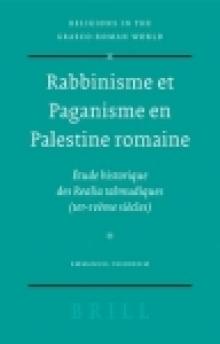
Rabbinisme et paganisme en Palestine romaine
Summaryהספר דן בעיקר במידת ידיעתם של חכמי ארץ-ישראל מימי המשנה והתלמוד על אודות הפגאניות מן התקופה הרומית המאוחרת, וכן מצביע על קיומם של יהודים עובדי עבודה זרה בארץ-ישראל הרומית-ביזנטית. וזאת בניגוד לדעתו של פרופ' א"א אורבך שהותיר משנת 1959 ועד שנות האלפיים את חותמו בעניין זה בהיסטוריוגרפיה של התקופה. אשר לחקר הידע של החכמים בענייני עבודת הנכר, יש להזכיר את דבריו של פרופ' שאול ליברמן: "פרטים בודדים על מנהגי עבודה זרה ועובדיה מפוזרים בכל כתבי הספרות התלמודית. הדיון בנושא זה לפרטיו היה מצריך חיבור שלם" (הנ"ל, יוונית ויוונות בארץ-ישראל, עמ' 245). חיבורנו מוכיח כי לחכמים היו אכן ידיעות הרבה יותר מעמיקות לגבי פולחנים פגאניים סוריים-פויניקיים, ערביים, אנטוליים ויווניים-רומיים, משחשבו תחילה בעולם המחקר, וכי הצורך בידיעות עיוניות נבע מן המציאות החברתית הבעייתית של יישובים מעורבים שהולידה תופעות של יהודים פוליתאיסטיים, ומכאן שאלות נוקבות בעניין הזהות היהודית בימי קדם.



